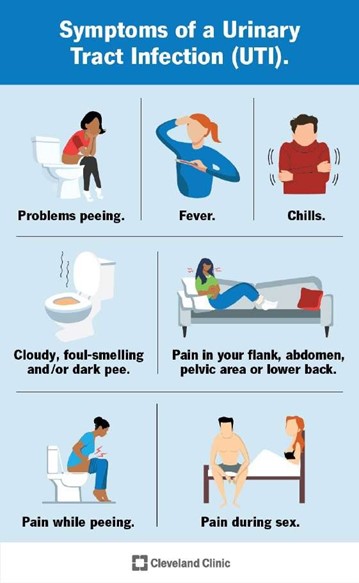A client is prescribed furosemide, a loop diuretic, for hypertension.
The nurse should instruct the client to monitor for which of the following signs of electrolyte imbalance (Select all that apply).
Muscle cramps.
Dry mouth.
Numbness and tingling.
Weakness and fatigue.
Tachycardia.
Correct Answer : A,C,D
Furosemide is a loop diuretic that causes the kidneys to excrete more water and salt, which can lead to dehydration and electrolyte imbalance.

Electrolyte imbalance can cause muscle cramps, numbness and tingling, weakness and fatigue, and other symptoms.
Therefore, the client should monitor for these signs and report them to the doctor if they occur.
Choice B is wrong because dry mouth is not a sign of electrolyte imbalance, but rather a sign of dehydration.
Dehydration can also cause thirst, decreased urination, drowsiness, and confusion.
Choice E is wrong because tachycardia is not a sign of electrolyte imbalance, but rather a sign of hypovolemia (low blood volume) or hypotension (low blood pressure).
Furosemide can lower blood pressure by reducing fluid volume in the body.
Therefore, the client should also monitor their blood pressure and pulse regularly while taking furosemide.
Nursing Test Bank
Naxlex Comprehensive Predictor Exams
Related Questions
Correct Answer is C
Explanation
Dysuria, which means pain or a burning sensation when peeing, is a common symptom of urinary tract infection (UTI).

UTIs are caused by bacteria entering the urinary tract through the urethra and spreading to the bladder or kidneys.
Choice A is wrong because nausea is not a specific symptom of UTI, although it may occur if the infection spreads to the kidneys.
Choice B is wrong because diarrhea is not a symptom of UTI, but rather a condition that affects the digestive system.
Choice D is wrong because constipation is also not a symptom of UTI, but a problem with bowel movements.
Normal ranges for urine tests vary depending on the type of test and the laboratory that performs it.
However, some general ranges are:
Specific gravity: 1.005 to 1.030
pH: 4.6 to 8.0
Protein: less than 150 mg/dL Glucose: less than 130 mg/dL Ketones: none
Blood: none Nitrites: none
Leukocyte esterase: none Bacteria: none or few
White blood cells: less than 5 per high-power field Red blood cells: less than 3 per high-power field Epithelial cells: few
Correct Answer is B
Explanation
This is a priority nursing intervention for a client with acute kidney injury (AKI) because it helps to assess the renal function and fluid status of the client. Urine output is also an indicator of the response to treatment and the need for further interventions.
Choice A is wrong because pain medication is not a priority intervention for AKI unless the client has other conditions that cause pain.
Pain medication may also have adverse effects on the kidney function and should be used with caution.
Choice C is wrong because ambulation is not a priority intervention for AKI and may not be appropriate for a client who is fluid overloaded or hypotensive.
Ambulation may also increase the risk of falls and injury in a client who is confused or fatigued.
Choice D is wrong because assisting with meals is not a priority intervention for AKI and may not be necessary for a client who has adequate oral intake.
A client with AKI may also have dietary restrictions such as low protein, low potassium, low sodium, and low phosphorus, which should be considered when providing meals.
Whether you are a student looking to ace your exams or a practicing nurse seeking to enhance your expertise , our nursing education contents will empower you with the confidence and competence to make a difference in the lives of patients and become a respected leader in the healthcare field.
Visit Naxlex, invest in your future and unlock endless possibilities with our unparalleled nursing education contents today
Report Wrong Answer on the Current Question
Do you disagree with the answer? If yes, what is your expected answer? Explain.
Kindly be descriptive with the issue you are facing.
